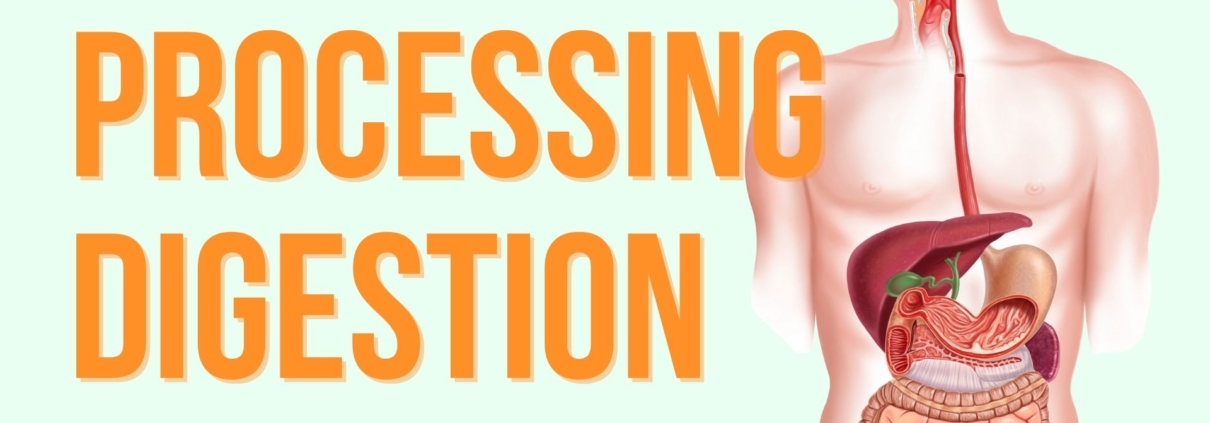Processing Digestion
Digestion for most of us is not even thought about when we eat.
It is only when we start having digestive issues that we think about this topic at all.
Digestion is the breakdown of large insoluble food molecules into small water-soluble food molecules so that they can be absorbed through the small intestine into the bloodstream.
When thinking of digestion, most of us simply forget that it starts in the mouth. So very important to really chew your food well and allow it to mix with the enzymes in our saliva.
Simply put digestion is both a mechanical and chemical process.
Process of Digestion
Firstly, there is the breakdown of food, into macronutrients, such as protein, carbohydrates, and fats, and micronutrients such as vitamins, minerals, and phytochemicals.
Then the process is continued with the release of hydrochloric acid in the stomach and a variety of enzymes throughout the digestive tract.
If this process is efficient then the majority of vitamin and mineral absorption will occur in the small bile from the gallbladder, and pancreatic enzymes from the pancreas further assist with digestion.
Once absorption has taken place, there are still some fibrous and fluid-based contents that pass into the large intestines where further water absorption occurs. What is left is discarded by excretion via the rectum and anus.
For many, this process does not occur as efficiently as described. And many may experience discomfort after eating either a portion of food that does not agree with them or simply when they overeat.
Symptoms could range from reflux and heartburn to abdominal pain, bloating, or cramping.
In the case of reflux and heartburn, it is common to reach for the pharmaceutical antacids such as Mylanta and Gaviscon for quick relief.
Of course, we will suggest natural remedies to help the problem.
Natural Remedies to Help Digestion
1. Apple cider vinegar may help to support digestion.
2. Digestive enzymes or supplements containing hydrochloric acid help to assist digestion too.
3. Certain herbs such as gentian, fennel, coriander, cumin, cardamom, and ginger can be helpful if we have overeaten or have sluggish digestion.
4. Bitter foods are particularly good to stimulate digestion, try including rocket, endive, chicory, or cabbage. Lemon, garlic, ginger, and apple cider vinegar, are great additions to salad dressings and stir-fries to help digestion.
As you can see digestive support is as close as your kitchen pantry!
Common Causes of Digestive Discomfort
This can occur due to overeating, eating too fast, poor diet, eating foods to which we have an intolerance or sensitivity, a lack of hydrochloric acid or enzyme production, or lack of bile production.
Mostly it is because of poor diet, or food sensitivities.
Certain foods are more likely to cause problems after eating them. These are generally processed foods, wheat, dairy, sugar, and fried foods. Coffee and alcohol are common culprits too.
How can we Avoid Digestive Issues?
Limiting foods that are known to cause problems in the digestive tract, such as wheat, dairy, caffeine, refined sugar, processed food, and alcohol, is recommended.
Instead choose a whole-food diet of foods that are as close to nature as possible – vegetables, fruit, lean grass-fed/organic beef, free-range chicken, wild-caught fish, legumes, nuts, seeds, and healthy fats.
Keeping a food and related symptom diary or even trying an elimination diet may be helpful to identify which foods may be aggravating your digestion.
As suggested above, chew thoroughly and eat slowly – if you don’t break down your food properly in the mouth, it gives the rest of the digestive tract more work.
Of course, give us a call on 9879 9596 or contact us to help you with any other digestive problems you may have.




Excellent helpful article.
Thanks Glenda
I’m so pleased you have found it useful.
Thanks for the excellent information, it really is useful.
Way trendy, some valid points! I appreciate you making this article available, the remainder of the website is also high quality. Have a fun.